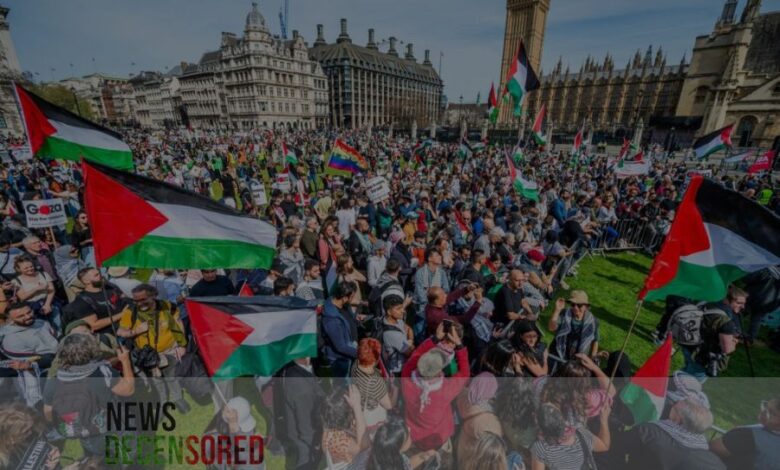UK Government Advisor calls for the Protest Organizers to pay Policing Cost

A consultant to the British government has proposed that persons planning to hold mass demonstrations in the UK, such as the current sit-in protest in London in support of Palestine, should be made to pay for the policing costs. The government’s independent adviser on political violence and disruption, John Woodcock, also advocated for the police to be given broader counter-protest measures.
However, the large-scale protests which turn into anarchist movements in Woodcock’s 240-page report published on Tuesday disrupt mass society, provoke law violations, put obstacles in front of police forces, and sometimes lead to injuries of officers. He suggested the government should consider putting into law the legal responsibility of protest organisers to cover cop expenses deemed necessary due to the protests’ associated seriousness or criminality.
Woodcock, a Labour MP in the House of Lords known as Lord Walney, went on to identify the pro-Palestine organising coalition and other activist associates of the far-left subculture… He further explained that there is a need to shield defence companies and energy suppliers from new protest laws.
As per pro-Palestine direct action group Palestine Action, better known for attacking Israeli company Elbit Systems, Woodcock was urging the State for such laws to make it feasible for businesses to sue organisers of such extremism protests for losses they caused. He stressed that energy suppliers and defenders, vital for the economy, security, and stability of nations, are the ones primarily attacked by radical protesters.
Thus, Woodcock’s report was introduced and discussed in the House of Commons. Due to the nature of the issue described in the report, it was made available to the Parliament as a non-contested motion (motion for unopposed return) and made available to the public as a parliamentary paper. This allows the report to include parliamentary privilege, preventing those groups highlighted in the report from suing it for defamation.
The Palestinian Solidarity Campaign (PSC) – the organisation mentioned in the report – denounced Woodcock for what it called an ‘extreme’ document whose agenda is to outlaw peaceful demonstrations. Speaking out, PSC alleged that Woodcock was taking the law for his political discord with previous pro-Palestine demonstrations. They opined that it would be beneficial to quell political protests because they are primarily helpful to the conducive corporate climate. In contrast, they kill the democracy that the demonstrates fight for.
”It did this on the same day that Liberty secured a court victory to stop an unlawful bid by the government to subvert the will of parliament and curtail the freedom of assembly,” PSC said.
The Muslim Association of Britain (MAB), also named in the report, described it as misleading and questioned Woodcock’s background as the former chair of Labour Friends of Israel. MAB proceeded to say that the branding of anti-genocide protesters as ‘extremists’ was very worrisome and went on to point out a rather sickening truth that the government and its supporters are comfortable with the stripping of civil liberties.
This Woodcock report came out at the same time as the UK High Court made its judgment in the civil liberty group Liberty. The protest was in response to what Liberty had described as the UK Home Office having provided the police with carte blanche to curb demonstrations. The court ruled that ex-home secretary Suella Braverman breached the law by approving various anti-protest measures without permission from Parliament.
The court decided that the legislation enshrined the change in the law in that it reduced the level of disruption required for the police to impose conditions on a protest from ‘serious disruption’ to ‘any disruption more than ‘minor’. Liberty welcomed the verdict and said that due to government inaction on defining what ‘serious disruption’ meant, the police could now interfere with protests significantly closer to everyday events.
The officials amended the law after determining that the government failed to consider the parliament’s will when expanding the concept of severe disruption by allowing the police to interfere with the protests that were closer to that which is regular or every day, as Liberty said in today’s ruling by Lord Justice Green and Mr Justice Kerr.
This ruling highlights the continuous conflict between the government’s exercise of power to control protests and supporters of freedoms in the United Kingdom.




